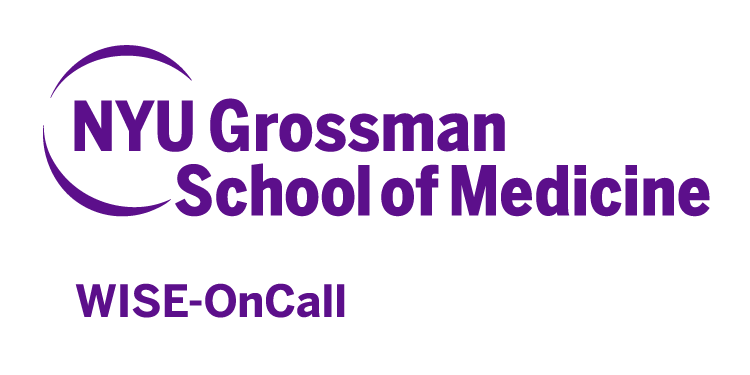A collection of 12 multimedia modules designed to educate learners (medical students, PA students, nursing students) about potential medical issues they may encounter while they are on call.
Created by the WISE Program at NYU Grossman School of Medicine.
Distributed by Aquifer on behalf of the WISE Program at NYU Grossman School of Medicine. Available through an independent learning platform from your Aquifer account.
Overview
WISE-OnCall helps healthcare learners prepare for their transition to residency and practice through a symptom-based review of conditions that they will likely encounter while on call.
The modules provide a common, pre-residency learning experience to students with different undergraduate educational experiences, serving as a base line for forming and building a clinical framework and as a “refresher” to fill gaps in students’ clinical knowledge as they transition to residency and practice.
The offering currently includes 12 modules, each focusing on a particular symptom or clinical skill. Modules incorporate a didactic review of key concepts and causes associated with the presenting symptoms, simulated cases which model a residents response to on-call scenarios, case-based practice questions which allow the student to test their knowledge, and symptom checklists to help students focus on the larger constellation of symptoms when prioritizing their differential. The modules also stress the importance of and model appropriate interprofessional communication.
- Expository review of topic
- Simulated cases with embedded topic-based questions
- Checklists based on symptoms and situations
- Case-based practice questions
- Each symptom-based module includes an introduction, a review of causes, a sample patient case, practice questions, and references
- The selection of module topics is informed by the Core Entrustable Professional Activities (EPAs) outlined by the Association of American Medical Colleges
- Modules currently cover many of the conditions requiring urgent or emergent care as specified in EPA 10
- Reviews key considerations associated with general clinical activities such as documenting clinical encounters (EPA 5)
WISE-OnCall has largely been targeted at 4th-year medical students’ preparation for and transition to residency. To that end, the offering’s design has been informed by the AAMC’s Core Entrustable Professional Activities.
Modules have been integrated into advanced clerkships at some institutions. Others have incorporated the modules into focused capstone or transition to residency courses. The modules could be integrated in the traditional third-year clerkships to introduce or review clinical reasoning. They have also been blended with preclinical coursework to demonstrating the practical clinical importance of concepts in the basic sciences.
In post-transition residency education, WISE-OnCall may be used as a baseline, self-directed learning activity to address the variability in incoming students’ educational experiences and increase their preparation for managing in-patient clinical situations.
An active research program at the NYU Grossman School of Medicine has been investigating the design and blending of first-person, “on-call” simulations with the self-directed WISE-OnCall modules to create a unified, pre-residency learning experience.
Ten of the modules focus on high-risk symptoms. Common causes are reviewed and a video case dramatization follows. The remaining two modules cover the clinical activities of Documentation and Certifying a Death.
Cases:
Abdominal Pain
Acute Chest Pain
Acute Pain Management
Certifying a Death
Documentation for Patient Safety
Dyspnea
Fever and Sepsis
Hypertension
Hypotension
Loss of Consciousness
Lower Extremity Pain
Oliguria
Learn More
Listen to the Aquifer Educator Connection Podcast with Jeff Manko, MD, Emergency Medicine Residency Program Director, NYU/Bellevue Medical Center, Director of GME Professional Development, co-Director of the WISE Programs, as he discusses how NYU Grossman School of Medicine pairs WISE-OnCall modules with their own simulation to onboard new residents and why this is a useful model for medical and health professions programs. He also explains how WISE-OnCall modules, whose development was informed by the AAMC’s EPAs, can be used to help learners diagnose and manage clinical situations they are likely to encounter on clinical clerkships, advanced sub-internships, and during the transition to residency or practice.



